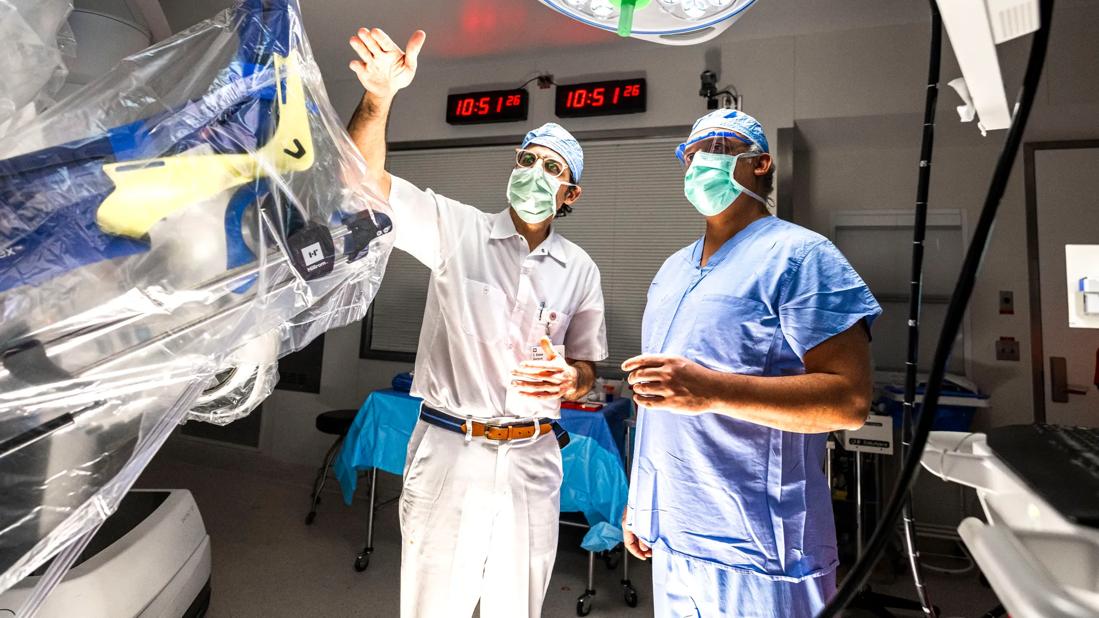Improving outcomes with minimally invasive surgery

The advantages of robotic-assisted surgery continue to be explored — especially for physicians and patients placing their hopes on complete removal of rectal cancer. This form of malignancy is often located deep in the pelvis and/or within close proximity to essential structures, making resection particularly challenging.
Advertisement
Cleveland Clinic is a non-profit academic medical center. Advertising on our site helps support our mission. We do not endorse non-Cleveland Clinic products or services. Policy
Better 3-D visualization, steadier instrumentation and an ability to successfully maneuver in a tight anatomic space are just some of the features associated with a robotic approach to rectal cancer surgery.
Robotic surgical systems also feature articulating instruments and other devices that can elevate the precision of the surgeon’s technique. The instruments, for example, can be inserted through small incisions in the abdomen and then articulated inside — turned in many different directions by the surgeon. Smart clamps and stapling devices that allow surgeons to cut across the bowel are examples of technology that further enhance the procedure.
Surgeons have used robotic-assisted techniques for years to help a whole range of patients — including those who need to undergo urologic procedures, ventral hernia repair and prostate surgery. Although many surgery subspecialties have adopted the technology, “When we are talking about surgery deep in the pelvis, that is when the advantages of robotic surgery become even more obvious,” says colorectal surgeon Emre Gorgun, MD.
The flexibility of articulating instruments becomes especially valuable in the reverse-cone shaped pelvis, where the deeper you go, the smaller the area becomes, Dr. Gorgun explains. This is particularly true in male patients who have a narrower pelvis, in general, compared with women. In addition, the robotic approach may help surgeons reach tumors in the anal canal or lower rectum, closer to the apex of the cone-shaped space.
Advertisement
Obese patients can also be good candidates for robotic-assisted surgery, particularly when other minimally invasive surgical techniques get more challenging. “Our own results suggest that robotic surgery compared with laparoscopy has similar short-term outcomes, with an additional benefit of quicker return of bowel function and shorter hospital stay in obese patients undergoing rectal cancer surgery,” Dr. Gorgun, along with colleague Ozgen Isik, MD, wrote in a 2015 report in the journal Clinics in Colon and Rectal Surgery. Other reports have demonstrated similar outcomes with other minimally invasive approaches, such as laparoscopy and transanal approaches.
Cleveland Clinic’s Center of Excellence features a specialized surgical team and a high volume of rectal cancer patients. In fact, its surgeons have performed more than 600 minimally invasive operations, including robotic assisted procedures, since 2011. “As a result, we have low recurrence rates, lower anastomotic complication rates and improved outcomes,” Dr. Gorgun says.
Cleveland Clinic surgeons not only perform robotic-assisted procedures for rectal cancer, they also use the technology to treat rectal prolapse, ulcerative colitis, Crohn’s disease, diverticular disease, constipation and endometriosis.
They also conduct research. Clinicians perform studies to share best practices and drive the entire field forward. For example, the 2015 report was a case-matched comparison finding similar outcomes between robotic and laparoscopic surgeries, except for longer operative times associated with the robotic approach.
Advertisement
In addition, an unpublished series of 29 robotic-assisted and 27 laparoscopic colectomies performed at Cleveland Clinic demonstrated similar outcomes. The oncologic findings and the 30-day short-term outcomes, for example, did not differ significantly between groups.
Cleveland Clinic also offers both fully robotic and hybrid robotic surgeries. Surgeons use the robot throughout a fully robotic approach, as the name implies. In contrast, during a hybrid approach, the surgeon begins the case with a laparoscopic flexure mobilization. “You can use laparoscopy to go faster. And when you get to the pelvis, we switch to a robotic-assisted approach,” Dr. Gorgun says.
When discussing robotic-assisted surgery with patients, Cleveland Clinic colorectal surgeons educate them how their cancer is removed can determine their long-term oncologic outcome. “For patients it’s an investment in their future, to potentially provide a lower risk for sequelae or recurrences of cancer in the pelvis.”
“Minimally invasive procedures such as a robotic approach may help us achieve better cure rates,” he says. “Also, the conversion rates especially in male and overweight patients may be lower than with laparoscopy, so the short-term outcomes can also improve. That’s among the reasons we recommend this to patients.”
Advertisement
Advertisement

Radiation therapy helped shrink hand nodules and improve functionality

Standard of care is linked to better outcomes, but disease recurrence and other risk factors often drive alternative approaches

Phase 1 study demonstrates immune response in three quarters of patients with triple-negative breast cancer

Multidisciplinary teams bring pathological and clinical expertise

Genetic variants exist irrespective of family history or other contributing factors

Study shows significantly reduced risk of mortality and disease complications in patients receiving GLP-1 agonists

Structured interventions enhance sleep, safety and caregiver resiliency in high-acuity units

Addressing rare disease and challenging treatment course in an active young patient